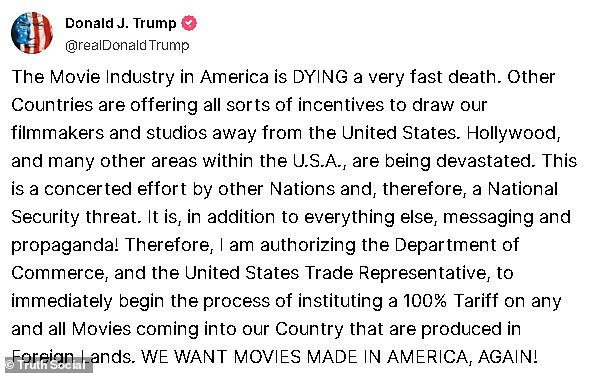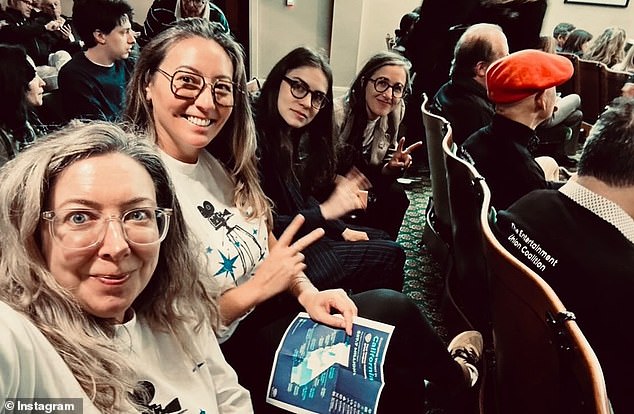President Donald Trump announced on Sunday that he would be imposing a 100 percent tariff on any movie produced outside of the United States.
By doing so, the president wants to save America’s movie industry from ‘dying a very fast death.
‘Other countries are offering all sorts of incentives to draw our filmmakers and studios away from the United States,’ he claimed on his Truth Social platform. ‘Hollywood and many other areas within the USA are being devastated.
‘This is a concerted effort by other Nations and therefore a National Security threat,’ the president declared.
‘It is, in addition to everything else, messaging and propaganda.’
Trump then announced that he is authorizing the Department of Commerce and the US Trade Representative to ‘immediately begin the process of instituting a 100 percent tariff on any and all Movies coming to our Country that are produced in Foreign Lands.
‘WE WANT MOVIES MADE IN AMERICA, AGAIN,’ he concluded.
The announcement comes as professionals have struggled to get movies and TV series to be completely filmed from beginning to end in Hollywood due to budget cuts for tax credits on productions.

President Donald Trump announced on Sunday that he is imposing a 100 percent tariff on movies produced outside the US

Trump made the announcement on his Truth Social platform
By the end of last year, FilmLA – the Los Angeles agency that handles film permits throughout the city – reported a 5 percent drop in film and TV production in the third quarter of 2024.
The 5,048 total film and TV shoot days also represented a whopping 36.4 percent drop from the five-year average.
At the same time, reality television production tumbled a massive 56.3 percent from the third quarter of 2024 compared with the year before – and represented a 52.7 percent drop against the five-year average.
Drama television production was also down 34.4 percent from the five-year average and comedy was down a staggering 85.7 percent from the five-year average.
Television production overall fell 18.3 percent, down also 53.2 percent from the five-year average over the quarter.
Now, experts warn, the once-booming city of the stars may be in decline.
‘This is not hyperbole to say that if we don’t act, the California film and TV industry will become the next Detroit auto,’ Noelle Stehman, a writer and producer who worked on The Sopranos and is a member of the ‘Stay in LA’ campaign, said last month.

Professionals have struggled to get movies and TV series to be completely filmed from beginning to end in Hollywood due to budget cuts for tax credits on productions
‘Stay in LA’ is a political organization that aims to fight for productions in Hollywood and ‘restore our city’s vibrant creative industry and lift the entire city of LA up in the process,’ according to its website.
While many politicians see increasing funds for the industry as a type of giveaway that isn’t all that crucial, others, including California State Senator Ben Allen and State Assemblyman Rick Zbur, have been trying to fight for more funds to flow into the struggling industry.
‘This is not a tax giveaway.’ This is a job program that is keeping people in their homes, keeping people off the unemployment rolls,’ Zbur said at the meeting.
‘If we don’t do this, it’s going to cost a lot, lot more than these tax credits are costing us.’

Brazilian director Walter Salles accepts the award for Best International Feature Film for “I’m Still Here” onstage during the 97th Annual Academy Awards
They have argued that they are losing business to countries like Austria and Vienna, where scoring work costs two-thirds less than it does in California.
In Bratislava, Slovakia, scoring cost 90 percent less than it does in Hollywood.
Karen Baker Landers, a supervising sound editor, also noted that other states have ‘carve outs,’ or a production incentive that would help ensure that projects that start in LA would wrap up production there as well, Indie Wire reported.
‘Depending on the size of a film, post-production can employ dozens to hundreds of people, the two-time Oscar winner said.
‘Traditionally, it’s not unusual to shoot out of state or out of country based on the creative needs of the story. However, it always came back to California to post. That’s not been the case anymore.
‘Visual effects, sound, picture, music, have been migrating out of California chasing these tax incentives. This has cost the state thousands of jobs not only in the entertainment industry but in all the business all around that support us.’
Landers said that New York and Louisiana currently have carve outs in place, as well as Spain and Australia.

‘Stay in LA’ is a political organization that aims to fight for productions in Hollywood and ‘restore our city’s vibrant creative industry and lift the entire city of LA up in the process.’ (Pictured: Noelle Stehman and other members of the group)
In their own effort to change that, California Gov. Gavin Newsom has proposed budget that would increase the state’s filming tax credit limit from $330 million to $750 million.
There are also two proposed state bills in play that would make the credits possible in California, both of which have been sponsored by Allen and Zbur.
Still, their organization recognizes that the credits are just one step in the right direction.
‘We know that it will take more work beyond the tax incentives to sustainably revitalize L.A.’s entertainment economy,’ the group said.







